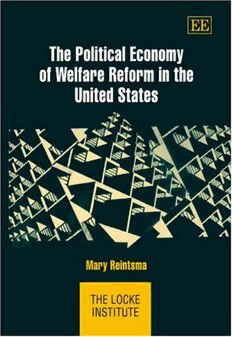
The Political Economy of Welfare Reform in the United States PDF
232 Pages·2007·0.852 MB·English
Most books are stored in the elastic cloud where traffic is expensive. For this reason, we have a limit on daily download.
Preview The Political Economy of Welfare Reform in the United States
Description:
The welfare system in the United States underwent profound changes as a result of the groundbreaking welfare legislation passed in 1996 entitled The Personal Responsibility and Work Opportunities Reconciliation Act (PRWORA). "The Political Economy of Welfare Reform in the United States" examines in detail the legislative process that gave rise to PRWORA and presents two alternative theories to explain this process; the traditional public interest model of government and the public choice model. On the basis of a detailed historical analysis of welfare programs and policies in the US, the author explains the two alternative theories and engages in a detailed institutional and statistical analysis to make a convincing argument for the validity of the public choice paradigm. Mary Reintsma's book reveals how the outcome of any legislation is highly dependent on the input of interest groups and the interactions of such groups with those responsible for passing the legislation. "The Political Economy of Welfare Reform in the United States" will appeal to academics and researchers involved in public sector economics, public choice theory and welfare economics reform.
See more
The list of books you might like
Most books are stored in the elastic cloud where traffic is expensive. For this reason, we have a limit on daily download.
